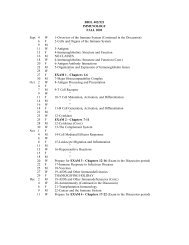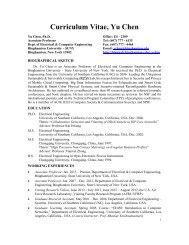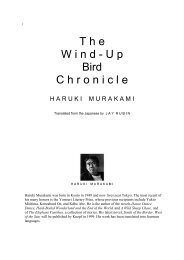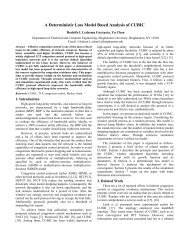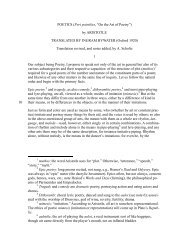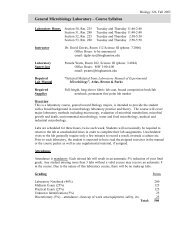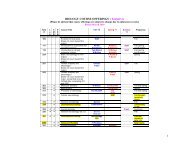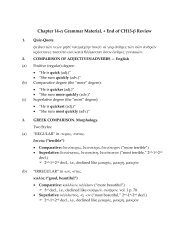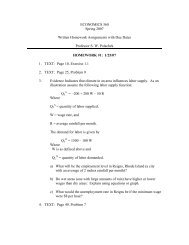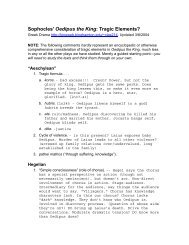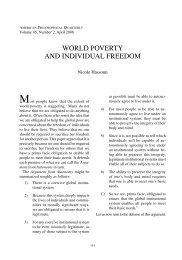Midterm Exam 3/20/08 STUDY GUIDE GREEK DRAMA - harvey
Midterm Exam 3/20/08 STUDY GUIDE GREEK DRAMA - harvey
Midterm Exam 3/20/08 STUDY GUIDE GREEK DRAMA - harvey
You also want an ePaper? Increase the reach of your titles
YUMPU automatically turns print PDFs into web optimized ePapers that Google loves.
<strong>Midterm</strong> <strong>Exam</strong> 3/<strong>20</strong>/<strong>08</strong> <strong>STUDY</strong> <strong>GUIDE</strong> <strong>GREEK</strong> <strong>DRAMA</strong>I. Passage IDs + Comment (approx. 35 mins.)PICK 2 FROM THE A-LIST AND 2 FROM THE B-LIST (4 total). At least a substantialparagraph for each.• Identify work, author, speaker, as appropriate• Briefly describe situation as appropriate: what is going on, where in the story the passage appears,how it fits into the larger picture• Discuss issues raised by passage• MAKE CLEAR WHICH PASSAGES YOU ADDRESSA-list.1a. [QUOTE]2a. [QUOTE]3a. [QUOTE]B-list.1b. [QUOTE]2b. [QUOTE]3b. [QUOTE]II.Essay (approx. 50 mins.)INTERPRETIVE LENSES: We have been using various “interpretive lenses” (“formulas,”analytical concepts, etc.) to get a firmer grasp of ancient Greek drama. Please commenton the usefulness and limits of these lenses in understanding dramas read for ourcourse, 31-Jan through 18-Mar. How do these lenses — really, genre expectations —enrich our understanding of specific plays? How do they restrict them? Is it possible toread beyond genre? Explain.Note that you will need to address the question as posed: to show knowledge of thelenses under consideration, to critique them as asked. Please address enough (not necessarilyall!) lenses, and enough dramas (by no means all) selected from among comediesand tragedies read, to make for a meaningful essay. You will need to provide multiple,clearly identified examples to make your point. Show me you understand the questionand have read the texts. DO NOT SIMPLY RECYCLE MATERIAL FROM SECTIONI. POINTS WILL BE TAKEN OFF FOR THAT.[End of question text; the following (over) are pointers you won’t find on the exam paper itself.. . .]
MIDTERM <strong>STUDY</strong> <strong>GUIDE</strong> 3/<strong>20</strong>/<strong>08</strong> 2This essay topic can be thought of as an exercise in critical thinking. Thus I will be evaluating your retention of basicand essential concepts and play-facts, and the ways you leverage that knowledge in analyzing texts, i.e., howwell you base interpretations on factual knowledge, and how well you critique approaches themselves.By “interpretive lens” I mean things like:• Aristotle’s Poetics and its analytical models/concepts• “Aeschylean” epiphany• “the tragic formula” (koros etc.)• “the comic formula”• Aristotle’s PoeticsWithin the framework of such lenses you may well find yourself addressing such matters as:• the cycle of suffering/violence• utopian escapism• pathei mathos (knowledge through suffering)• blood-guilt• formal/structural features of drama (parodos, kommos, stasimon, parabasis, etc.)Even if the above helps you understand drama (and I’m not saying it does), still, its usefulness must stop shortsomewhere. How do you take it to the next level?MEMORIZE TITLES, AUTHORS’ NAMES, MAIN CHARACTERS, BASIC STORY-LINESREVIEW TERMS FROM QUIZ 1REVIEW TERMS SINCE QUIZ 1:• Areopagus Council, Areopagus court (Aeschylus Eumenides)• binding song (Aeschylus Eumenides)• blood-guilt• closure• deus ex machina (Medea, Ladies’ Day)• drasanta pathein. (the law of “let the doer suffer,” from Aeschylus Libation Bearers, lines 319–3<strong>20</strong>: “stroke forbloody stroke be paid. The one who acts must suffer”)• Erinus (“Fury”)• paratragedy (Ladies’ Day, comedy generally)• pharmakos (OK)• pollution (OK)• sophist, sophistic (Medea)• Thesmophoria (Ladies’ Day)• thūmos (Medea)



